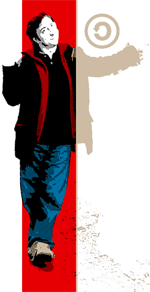 Interview with Bruce Perens
Interview with Bruce Perens
Arturo Di Corinto
Rome – Italy
a dot dicorinto at uniroma1 dot it
>Who is Mr. Bruce Perens?
I’m father of a 7-year-old boy, a husband, and after those come all of these technical things. I’m probably best known as the author of the Open Source definition, the manifesto of Open Source software and the rules for its licensing. I’m vice president of Sourcelabs, a venture-funded startup company that services Open Source. But I spend half of my work time being an Open Source leader, and Sourcelabs can’t tell me what to do or say in that capacity. It must be that way for me to maintain my credibility.
>How many times have you been in Italy? And with Richard Stallman?
I love Italy and we remember very fondly hiking around Lake Como when my little boy was one year old and he was riding on my backpack. Everywhere we went, people were saying “Bello Bambino! Caro!” My family and I have visited Rome, Florence, Milan, Sienna, Brunello, the Cinque Terre and Portofino. I’ve been to Milan several times to give speeches.
>What was your role in the Free software movement’s “forking” towards the Open Source Initiative?
I certainly never intended it to be a fork. Richard Stallman’s “Free Software” campaign and Open Source are just two ways of talking about the same thing. Richard’s campaign appeals to the kind of person who can put freedom ahead of business. Open Source was intended to show business people that Free Software was good for business, too. I thought that Open Source would lead business people to eventually appreciate Richard’s ideas. Unfortunately, Eric Raymond felt it was necessary to distance Open Source from Free Software and from Richard personally. Eric doesn’t matter any longer, and Richard and I are here in Italy talking with government and industry.
Richard still says he’s not a “Free Software” supporter and not associated with “Open Source”. I think he was hurt very badly by Eric’s actions.
Why in a world starving, fighting, frightened by terrorism should we care of software and of open source software?
We live in an electronic world. And the way to avoid starvation and terrorism is to have democracy and justice. But in this day and age, democratic discourse – the discussions of a free people by which they maintain their own freedom – are carried out by electronic means: via television, radio, and the internet. Before Gutenberg’s printing press, only the rich and the church had control over printing, and the advent of the press actually made mass democracy possible because it made widespread printed discussion a tool of all classes. And then again only the rich controlled radio and television. So, the internet is like the printing press all over again – it gives all classes the ability to broadcast democratic discourse and be heard widely.
>Do you think that OSS can have a role in maintaining Internet democracy?
Would you trust a car if the hood was locked and only the dealer was allowed to have a key? Open Source is software you can trust, because you can know for sure what is inside it, and you can control it completely. We need that kind of trust and control because computers are such important tools of society. They control how we communicate to an increasing extent.
What would you say if I’d say: OSS=innovation?
Look at he latest version of Microsoft Internet Explorer. Microsoft is copying features that were innovated by Firefox. Look at Windows Vists, the main feature of which is to lock down the customer with digital rights management more severely than ever before, as if it were a policeman in your living room. That’s so anti-customer. Open Source is the opposite of that, giving the user all possible control.
Could you please explain to us why OSS means business being at the same time a non rivalrous public good?
There’s a more important explanation for business people. What software differentiates your business – meaning what software makes your business more attractive to the customer than the competition? Shouldn’t you be spending as much as possible of your software development money and effort on business differentiators? But you need infrastructure, too, to help your business work, even though it’s non-differentiating. Open Source is a way for business (and others) to share the cost and risk of non-differentiating infrastructure software development.
OLPC plus OSS, good job! And now?
What most people don’t understand about One Laptop Per Child is that its main purpose is to give those kids textbooks. Their countries don’t have enough to spend on textbooks, so we’re making Open Source books to deliver on the OLPC. I have a book series that has made 24 computer textbooks that are available online as Open Source. We also sell them in print.
>Business, politics and OS software…just the last insight
>Bruce, do you consider yourself an innovator?
The big innovation of Open Source is that worldwide collaboration on software development actually worked better than the way companies were making software up until then. No operating system comes close to doing all that Linux can do now. Nobody thought it was possible to develop that way, or to make a single product do so much, so well. But some of the best collaborators have never met face-to-face. Somenow, that doesn’t seem to get in their way.

